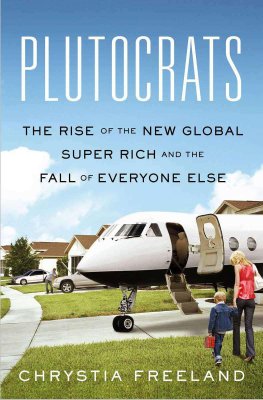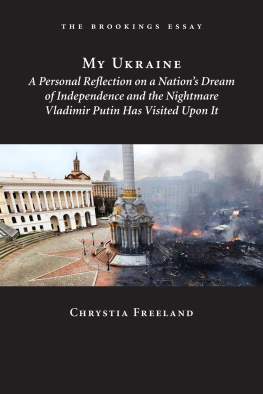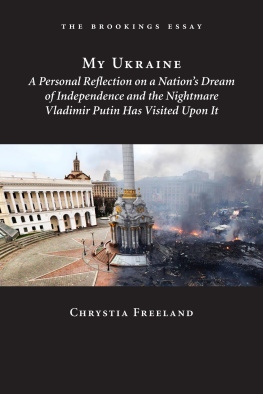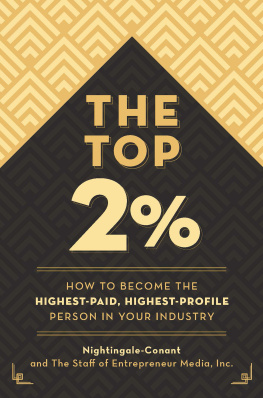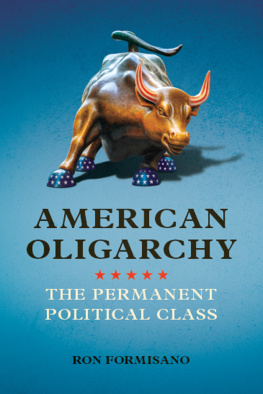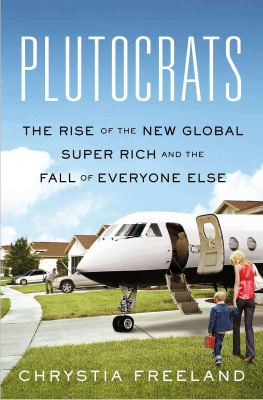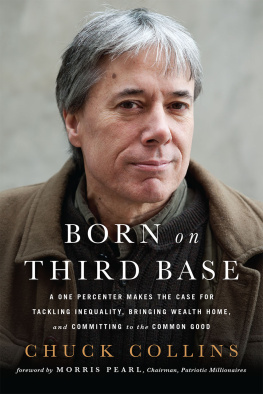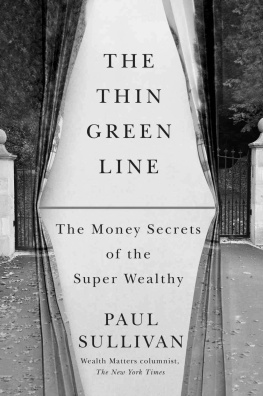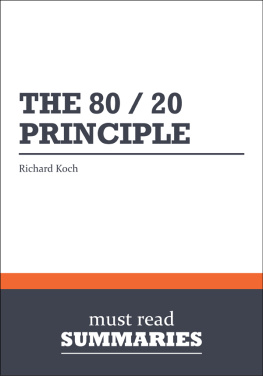Chrystia Freeland
PLUTOCRATS
THE RISE of the NEW GLOBAL SUPER-RICH and the FALL OF EVERYONE ELSE

In memory of my mother,
Halyna Chomiak Freeland
INTRODUCTION

The poor enjoy what the rich could not before afford. What were the luxuries have become the necessaries of life. The laborer has now more comforts than the farmer had a few generations ago. The farmer has more luxuries than the landlord had, and is more richly clad and better housed. The landlord has books and pictures rarer and appointments more artistic than the king could then obtain.
Andrew Carnegie
Branko Milanovic is an economist at the World Bank. He first became interested in income inequality studying for his PhD in the 1980s in his native Yugoslavia, where he discovered it was officially viewed as a sensitive subjectwhich meant one the ruling regime didnt want its scholars to look at too closely. That wasnt a huge surprise; after all, the central ideological promise of socialism was to deliver a classless society.
But when Milanovic moved to Washington, he discovered a curious thing. Americans were happy to celebrate their super-rich and, at least sometimes, worry about their poor. But putting those two conversations together and talking about economic inequality was pretty much taboo.
I was once told by the head of a prestigious think tank in Washington, D.C., that the think tanks board was very unlikely to fund any work that had income or wealth inequality in its title, Milanovic, who wears a beard and has a receding hairline and teddy bear build, explained in a recent book. Yes, they would finance anything to do with poverty alleviation, but inequality was an altogether different matter.
Why? he asked. Because my concern with the poverty of some people actually projects me in a very nice, warm glow: I am ready to use my money to help them. Charity is a good thing; a lot of egos are boosted by it and many ethical points earned even when only tiny amounts are given to the poor. But inequality is different: Every mention of it raises in fact the issue of the appropriateness or legitimacy of my income.
The point isnt that the super-elite are reluctant to display their wealththat is, after all, at least part of the purpose of yachts, couture, vast homes, and high-profile big-buck philanthropy. But when the discussion shifts from celebratory to analytical, the super-elite get nervous. One Wall Street Democrat, who has held big jobs in Washington and at some of Americas top financial institutions, told me President Barack Obama had alienated the business community by speaking about the rich. It would be best not to refer to income differences at all, the banker said, but if the president couldnt avoid singling out the countrys top earners, he should call them affluent. Naming them as rich, he told me, sounded divisivesomething the rich dont want to be. Striking a similar tone, Bill Clinton, in his 2011 book, Back to Work, faulted Barack Obama for how he talks about those at the top. I didnt attack them for their success, President Clinton wrote, attributing to that softer touch his greater success in getting those at the top to accept higher taxes.
Robert Kenny, a Boston psychologist who specializes in counseling the super-elite, agrees. He told an interviewer that often the word rich becomes a pejorative. It rhymes with bitch. Ive been in rooms and seen people stand up and say, Im Bob Kenny and Im rich. And then they burst into tears.
It is not just the super-rich who dont like to talk about rising income inequality. It can be an ideologically uncomfortable conversation for many of the rest of us, too. Thats because evenor perhaps particularlyin the view of its most ardent supporters, global capitalism wasnt supposed to work quite this way.
Until the past few decades, the received wisdom among economists was that income inequality would be fairly low in the preindustrial eraoverall wealth and productivity were fairly small, so there wasnt that much for an elite to capturethen spike during industrialization, as the industrialists and industrial workers outstripped farmers (think of China today). Finally, in fully industrialized or postindustrial societies, income inequality would again decrease as education became more widespread and the state played a bigger, more redistributive role.
This view of the relationship between economic development and income inequality was first and most clearly articulated by Simon Kuznets, a Belarusian-born immigrant to the United States. Kuznets illustrated his theory with one of the most famous graphs in economicsthe Kuznets curve, an upside-down U that traces the movement of society as its economy becomes more sophisticated and productive, from low inequality, to high inequality, and back down to low inequality.
Writing in the early years of the industrial revolution, and without the benefit of Kuznetss data and statistical analysis, Alexis de Tocqueville came up with a similar prediction: If one looks closely at what has happened to the world since the beginning of society, it is easy to see that equality is prevalent only at the historical poles of civilization. Savages are equal because they are equally weak and ignorant. Very civilized men can all become equal because they all have at their disposal similar means of attaining comfort and happiness. Between these two extremes is found inequality of condition, wealth, knowledgethe power of the few, the poverty, ignorance, and weakness of the rest.
If you believe in capitalismand nowadays pretty much the whole world doesthe Kuznets curve was a wonderful theory. Economic progress might be brutal and bumpy and create losers along the way. But once we reached that Tocquevillian plateau of all being very civilized men (yes, men!), we would all share in the gains. Until the late 1970s, the United States, the worlds poster child of capitalism, was also an embodiment of the Kuznets curve. The great postwar expansion was also the period of what economists have dubbed the Great Compression, when inequality shrank and most Americans came to think of themselves as middle class. This was the era when, in the words of Harvard economist Larry Katz, Americans grew together. That seemed to be the natural shape of industrial capitalism. Even the Reagan Revolution rode on the coattails of this paradigmtrickle-down economics, after all, emphasizes the trickle.
But in the late 1970s, things started to change. The income of the middle class started to stagnate and those at the top began to pull away from everyone else. This shift was most pronounced in the United States, but by the twenty-first century, surging income inequality had become a worldwide phenomenon, visible in most of the developed Western economies as well as in the rising emerging markets.
The switch from the America of the Great Compression to the America of the 1 percent is still so recent that our intuitive beliefs about how capitalism works havent caught up with the reality. In fact, surging income inequality is such a strong violation of our expectations that most of us dont realize it is happening.
That is what Duke University behavioral economist Dan Ariely discovered in a 2011 experiment with Michael Norton of Harvard Business School. Ariely showed people the wealth distribution in the United States, where the top 20 percent own 84 percent of the total wealth, and in Sweden, where the share of the top 20 percent is just 36 percent. Ninety-two percent of respondents said they preferred the wealth distribution of Sweden to that of the United States today. Ariely then asked his subjects to give their ideal distribution of wealth for the United States. Respondents preferred that the top 20 percent own just 32 percent of total wealth, an even more equitable distribution than Swedens. When it comes to wealth inequality, Americans would prefer to live in Swedenor in the late 1950s compared to the United States today. And they would like kibbutz-style egalitarianism best of all.

